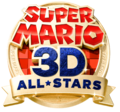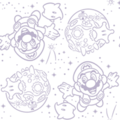Super Mario 3D All-Stars: Difference between revisions
RobbyB3ll4s (talk | contribs) Tag: Mobile edit |
(Tried to make new changes more accurate - motion controls are supported for the Pro Controller as well, and updated control information is across all the games.) |
||
| Line 17: | Line 17: | ||
'''''Super Mario 3D All-Stars''''' is a [[Nintendo Switch]] compilation game, released on September 18, 2020 to celebrate the [[Super Mario Bros. 35th Anniversary|35th anniversary]] of ''[[Super Mario Bros.]]''<ref name=Direct/> It contains ''[[Super Mario 64]]'' (1996), ''[[Super Mario Sunshine]]'' (2002), and ''[[Super Mario Galaxy]]'' (2007) with upscaled visuals. It has been made available in limited quantities as a retail edition, and a digital edition available until late March 2021.<ref name=Direct/> The compilation and name is based on ''[[Super Mario All-Stars]]'', but instead contains the first three 3D platformers of the ''[[Super Mario (series)|Super Mario]]'' series. | '''''Super Mario 3D All-Stars''''' is a [[Nintendo Switch]] compilation game, released on September 18, 2020 to celebrate the [[Super Mario Bros. 35th Anniversary|35th anniversary]] of ''[[Super Mario Bros.]]''<ref name=Direct/> It contains ''[[Super Mario 64]]'' (1996), ''[[Super Mario Sunshine]]'' (2002), and ''[[Super Mario Galaxy]]'' (2007) with upscaled visuals. It has been made available in limited quantities as a retail edition, and a digital edition available until late March 2021.<ref name=Direct/> The compilation and name is based on ''[[Super Mario All-Stars]]'', but instead contains the first three 3D platformers of the ''[[Super Mario (series)|Super Mario]]'' series. | ||
Changes from the original games include 720p resolution and rumble in ''Super Mario 64'' (which was also featured in ''Shindō Pak Taiō Version''), 1080p resolution and a 16:9 aspect ratio in ''Super Mario Sunshine'', and 1080p resolution and | Changes from the original games include 720p resolution and rumble in ''Super Mario 64'' (which was also featured in ''Shindō Pak Taiō Version''), 1080p resolution and a 16:9 aspect ratio in ''Super Mario Sunshine'', and 1080p resolution and motion controls that mimic the Wii Remote in ''Super Mario Galaxy''.<ref>Video Games Chronicle (September 3, 2020). [https://www.videogameschronicle.com/news/super-mario-3d-collection/ Super Mario 3D All-Stars has finally been revealed for Nintendo Switch]. Retrieved September 3, 2020.</ref> All three games support docked, tabletop, and handheld modes, with ''Super Mario Galaxy'' having the player use the {{button|ns|y}} button to spin and emulate the pointer with the touch screen on handheld mode.<ref>[https://www.nintendolife.com/news/2020/09/yes_theres_a_handheld-mode_workaround_for_super_mario_galaxys_spin_move_on_switch Nintendo Life] (September 9, 2020). Retrieved September 10, 2020.</ref> Each game also modifies control graphics and tutorial text to correspond to the Nintendo Switch.<ref>GameXplain. (September 9, 2020). [https://youtu.be/_moxTSrP-5c You Can Now Spin With "Y" in Super Mario Galaxy! - Super Mario 3D All-Stars]. Retrieved September 9, 2020.</ref> Additionally, the game contains a "Super Mario Music Player" mode with the soundtracks of the three respective games, including 175 tracks in total.<ref>https://supermario3dallstars.nintendo.com/music-player/</ref> | ||
The main menu of the game, along with the selection of the games, displays the original release date and system of each game, along with a description of the games' stories and mechanics introduced for those games.<ref>GameXplain. (September 12, 2020). [https://youtu.be/LuMNWVkzkzo Super Mario 3D All-Stars Title Screen & Menus Revealed!]. Retrieved September 13, 2020.</ref> | The main menu of the game, along with the selection of the games, displays the original release date and system of each game, along with a description of the games' stories and mechanics introduced for those games.<ref>GameXplain. (September 12, 2020). [https://youtu.be/LuMNWVkzkzo Super Mario 3D All-Stars Title Screen & Menus Revealed!]. Retrieved September 13, 2020.</ref> | ||
Revision as of 16:50, September 18, 2020
This article is about a game that has just been released on September 18, 2020. Major changes should be made by a contributor who has a reliable source.
This notice should be removed after a month has passed since the game was first released.
- Not to be confused with Super Mario All-Stars.
Template:Infobox Super Mario 3D All-Stars is a Nintendo Switch compilation game, released on September 18, 2020 to celebrate the 35th anniversary of Super Mario Bros.[1] It contains Super Mario 64 (1996), Super Mario Sunshine (2002), and Super Mario Galaxy (2007) with upscaled visuals. It has been made available in limited quantities as a retail edition, and a digital edition available until late March 2021.[1] The compilation and name is based on Super Mario All-Stars, but instead contains the first three 3D platformers of the Super Mario series.
Changes from the original games include 720p resolution and rumble in Super Mario 64 (which was also featured in Shindō Pak Taiō Version), 1080p resolution and a 16:9 aspect ratio in Super Mario Sunshine, and 1080p resolution and motion controls that mimic the Wii Remote in Super Mario Galaxy.[2] All three games support docked, tabletop, and handheld modes, with Super Mario Galaxy having the player use the button to spin and emulate the pointer with the touch screen on handheld mode.[3] Each game also modifies control graphics and tutorial text to correspond to the Nintendo Switch.[4] Additionally, the game contains a "Super Mario Music Player" mode with the soundtracks of the three respective games, including 175 tracks in total.[5]
The main menu of the game, along with the selection of the games, displays the original release date and system of each game, along with a description of the games' stories and mechanics introduced for those games.[6]
Controls
Super Mario 64
- , - Move Mario/cursor, climb poles, angle camera in second-person mode, fly (when wearing the Wing Cap)[7]
- , - Jump, swim, talk, confirm[7]
- , - Punch, dive, grab, throw, cancel[7]
- , - Crouch[7]
- , - Switch camera modes[7]
- - Adjust camera[7]
- - Pause menu[7]
- - Suspend menu[7]
Super Mario Sunshine
- - Move Mario, aim F.L.U.D.D. (while holding R)[8]
- , - Jump, swim, talk[8]
- - Switch Nozzles[8]
- - Pick up, dive[8]
- - Center camera[8]
- - Run while spraying (while using Squirt Nozzle)[8]
- - Guidebook[8]
- - Use F.L.U.D.D. (spray and aim while using Squirt Nozzle)[8]
- - Move camera[8]
- (click in) - Mario Cam[8]
- - Pause menu[8]
- - Suspend menu[8]
Super Mario Galaxy
- : Move[9]
- , : Jump/swim[9]
- , , (shake): Spin[9]
- (grounded): Crouch[9]
- (midair): Ground Pound[9]
- : Fire Star Bit[9]
- : Center camera[9]
- : Reset pointer[9]
- : Change camera view[9]
- (move): Aim[9]
- - Pause menu[9]
- - Suspend menu[9]
Differences and changes
Changes to Super Mario 64
- The game is based on Shindō Pak Taiō Version, available in English for the first time. However, the notice for compatibility with the Rumble Pak has been removed.
- In the screen with Mario's head, the text saying "PRESS START" now says "PRESS ", with a brand new text icon.
- The Stereo option is removed, likely due to the Nintendo Switch already having such an option in its settings.
- The game's camera controls has been flipped to be normal instead of inverted.
- The directional buttons/D-pad now acts as full analog presses on the control stick.
- The text has been updated to reflect the new controls.
Changes to Super Mario Sunshine
- On the title screen, the text is changed from "PRESS START!" to "PRESS ".
- The Rumble option no longer has the image of the GameCube Controller.
- In F.L.U.D.D’s tutorial video, F.L.U.D.D says “press the button to shoot water” instead of “press the R button to shoot water”.
- The Stereo/Mono/Surround option is removed, likely due to the Nintendo Switch already having such an option in its settings.
- The game's camera controls has been flipped to be normal instead of inverted.
- A glitch in the emulator allows Scrubbing Sirena Beach to be completed with much less electric goop being cleaned than intended.[10]
Changes to Super Mario Galaxy
- The player only needs to press one button () on the title screen, rather than two buttons simultaneously (
 and
and  ) like in the original Wii release.
) like in the original Wii release. - Miis can no longer be selected as a save icon.
- Due to the lack of speakers in the Joy-Con controllers, any sounds played through the Wii Remote speaker are absent.
- The animated icon for how to spin by shaking the Wii Remote has now been changed to a Joy-Con.
- The game features extra tutorial dialogue to accommodate for handheld mode.
Update history
Version 1.0.1
Release date: September 17, 2020[11]
- Fixed/adjusted the display in Super Mario Galaxy when playing in Co-Star mode.
- In order to let you play the game more comfortably, we have also fixed some issues.
Gallery
- For this subject's image gallery, see Gallery:Super Mario 3D All-Stars.
Super Mario 64 artwork of Mario grabbing Bowser by his tail
References to other games
- Super Mario Galaxy 2: This game's "You Got a Star!" fanfare plays before the title screen appears.
Names in other languages
| Language | Name | Meaning | Notes |
|---|---|---|---|
| Chinese (simplified) | 超级马力欧 3D 收藏辑[?] Chāojí Mǎlì'ōu 3D Shōucángjí |
Super Mario 3D Collection | |
| Chinese (traditional) | 超級瑪利歐 3D 收藏輯[?] Chāojí Mǎlì'ōu 3D Shōucángjí |
Super Mario 3D Collection | |
| Korean | 슈퍼 마리오 3D 컬렉션[?] Syupeo Mario 3D Keollegsyeon |
Super Mario 3D Collection |
Trivia
- Despite all three titles in Super Mario 3D All-Stars being known to be fully localized in Simplified Chinese (albeit with Super Mario Sunshine's Chinese edition being unreleased), the collection does not include any of the Chinese localization and only offers Chinese translation in the game menu.[12] It was said that negotiations were attempted, but was ultimately unsuccessful as iQue/Nvidia Shield localization was considered "spin-off" translations not in direct ownership of Nintendo.[13]
External links
References
- ^ a b Cite error: Invalid
<ref>tag; no text was provided for refs namedDirect - ^ Video Games Chronicle (September 3, 2020). Super Mario 3D All-Stars has finally been revealed for Nintendo Switch. Retrieved September 3, 2020.
- ^ Nintendo Life (September 9, 2020). Retrieved September 10, 2020.
- ^ GameXplain. (September 9, 2020). You Can Now Spin With "Y" in Super Mario Galaxy! - Super Mario 3D All-Stars. Retrieved September 9, 2020.
- ^ https://supermario3dallstars.nintendo.com/music-player/
- ^ GameXplain. (September 12, 2020). Super Mario 3D All-Stars Title Screen & Menus Revealed!. Retrieved September 13, 2020.
- ^ a b c d e f g h https://twitter.com/supermario35th/status/1302811241719750656
- ^ a b c d e f g h i j k l https://www.destructoid.com/stories/here-s-how-all-of-the-new-switch-controls-work-for-super-mario-3d-all-stars-603729.phtml
- ^ a b c d e f g h i j k l https://youtu.be/nuvizFhzf5c?t=146
- ^ https://twitter.com/toobou/status/1306643876598349824
- ^ https://nintendoeverything.com/super-mario-3d-all-stars-update-out-now-version-1-0-1-patch-notes/
- ^ https://twitter.com/chinesenintendo/status/1301599829626249216?s=20
- ^ https://twitter.com/MetalMarioJSKR/status/1302445969770913792?s=20



